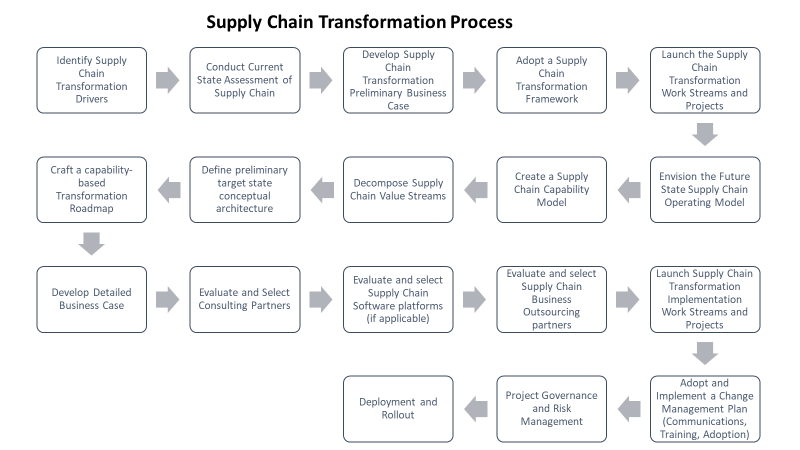Supply Chain Transformation Process
By: Ciopages Staff Writer
Updated on: Feb 25, 2023

Supply Chain Transformation Process is an encapsulation of the depth and breadth of effort required to transform Supply Chain functions to excel in the digital age to support the needs of an omnichannel world.
The Supply Chain Transformation process is complicated, arduous, and costly. All the steps in the Supply Chain transformation process are necessary, and not doing some or not doing well can lead to the collapse of the program and have long-term adverse consequences.
The Supply Chain transformation process is complex, arduous, and costly.
A list of some of the critical steps that if not done or done wrong can exacerbate the failure risks are as follows:
a) Not understanding the Supply Chain value streams well and how the experience of these value streams needs to reshape in the future. b) Lack of a detailed Supply Chain business capability model. c) Supply Chain technology has become a critical success factor in transforming the Supply Chain function, particularly the new wave of cloud-based Supply Chain technology platforms. Selecting a Supply Chain software platform that does not meet the needs will lead to failure. Moreover, d) Underinvestment into change management and adoption is another issue that afflicts major Supply Chain transformation programs.
Supply Chain Transformation Process Steps:
The Key Steps in the Supply Chain Transformation Process:
• Identify Supply Chain Transformation Drivers
• Conduct Current State Assessment of Supply Chain
• Develop Supply Chain Transformation Preliminary Business Case
• Adopt a Supply Chain Transformation Framework
• Launch the Supply Chain Transformation Work Streams and Projects
• Envision the Future State Supply Chain Operating Model
• Create a Supply Chain Capability Model
• Decompose Supply Chain Value Streams
• Define preliminary target state conceptual architecture
• Craft a capability-based Transformation Roadmap
• Develop Supply Chain Transformation Detailed Business Case
• Evaluate and Select Consulting Partners
• Assess and select Supply Chain Software platforms (if applicable)
• Evaluate and select Supply Chain Business Outsourcing partners (if applicable)
• Launch Supply Chain Transformation Implementation Work Streams and Projects
• Adopt and Implement a Change Management Plan (Communications, Training, Adoption)
• Project Governance and Risk Management
• Deployment and Rollout
Learn more about CIOPages.com Supply Chain Transformation. Moreover, find out more about the Supply Chain Transformation Toolkit.
Products Related to Supply Chain Transformation Process:
Articles Related to Supply Chain Transformation Process: